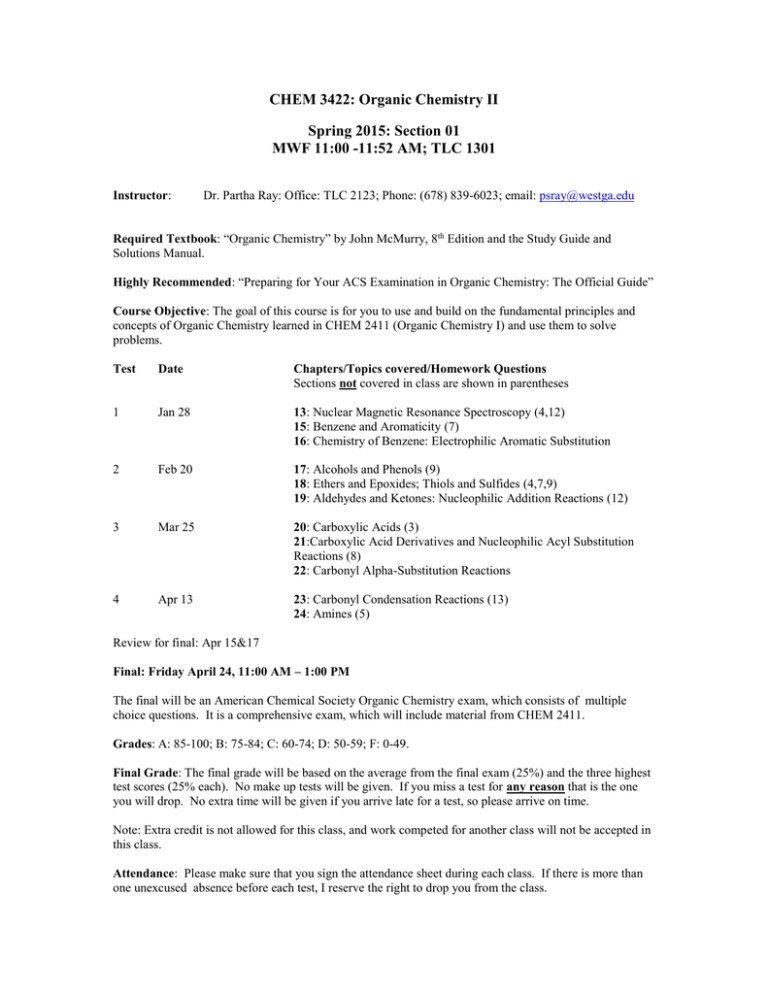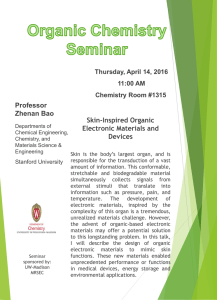CHEM 3422_Ray
advertisement

CHEM 3422: Organic Chemistry II Spring 2015: Section 01 MWF 11:00 -11:52 AM; TLC 1301 Instructor: Dr. Partha Ray: Office: TLC 2123; Phone: (678) 839-6023; email: psray@westga.edu Required Textbook: “Organic Chemistry” by John McMurry, 8th Edition and the Study Guide and Solutions Manual. Highly Recommended: “Preparing for Your ACS Examination in Organic Chemistry: The Official Guide” Course Objective: The goal of this course is for you to use and build on the fundamental principles and concepts of Organic Chemistry learned in CHEM 2411 (Organic Chemistry I) and use them to solve problems. Test Date Chapters/Topics covered/Homework Questions Sections not covered in class are shown in parentheses 1 Jan 28 13: Nuclear Magnetic Resonance Spectroscopy (4,12) 15: Benzene and Aromaticity (7) 16: Chemistry of Benzene: Electrophilic Aromatic Substitution 2 Feb 20 17: Alcohols and Phenols (9) 18: Ethers and Epoxides; Thiols and Sulfides (4,7,9) 19: Aldehydes and Ketones: Nucleophilic Addition Reactions (12) 3 Mar 25 20: Carboxylic Acids (3) 21:Carboxylic Acid Derivatives and Nucleophilic Acyl Substitution Reactions (8) 22: Carbonyl Alpha-Substitution Reactions 4 Apr 13 23: Carbonyl Condensation Reactions (13) 24: Amines (5) Review for final: Apr 15&17 Final: Friday April 24, 11:00 AM – 1:00 PM The final will be an American Chemical Society Organic Chemistry exam, which consists of multiple choice questions. It is a comprehensive exam, which will include material from CHEM 2411. Grades: A: 85-100; B: 75-84; C: 60-74; D: 50-59; F: 0-49. Final Grade: The final grade will be based on the average from the final exam (25%) and the three highest test scores (25% each). No make up tests will be given. If you miss a test for any reason that is the one you will drop. No extra time will be given if you arrive late for a test, so please arrive on time. Note: Extra credit is not allowed for this class, and work competed for another class will not be accepted in this class. Attendance: Please make sure that you sign the attendance sheet during each class. If there is more than one unexcused absence before each test, I reserve the right to drop you from the class. Suggested problems: No homework will be collected. However, it is expected that you will attempt to solve the assigned problems at the end of each chapter which are grouped by topics. It is highly recommended that you first attempt to solve the problems without the use of the solution manual, and refer to the manual to check your answer. Obviously, the more problems you solve the better understanding you will have for the material. The best way to make sure that you have understood the material covered in class is to work through the appropriate problems on a regular basis. I also highly recommend attempting the problems from the ACS book as a good way to prepare for the tests (selected problems are posted on CourseDen). Unsocial behavior such as talking during class or being disruptive will not be tolerated and you will be asked to leave the class. Please remember to silence your cell phones during class. All communications outside of class should be via campus mail (myUWG), and you are expected to check your mail regularly. Exams: Cell phones, calculators, and any other electronic device must be stored away and may not be visible during exams. I reserve the right to ask you to sit at an assigned seat in the classroom during exam days. Scantrons: You will need a total of 5 scantron forms (#229629) for the tests and final. Folded or crumpled forms will not be accepted. These forms will NOT be available in class. Academic Honesty: o All exams will be closed book/closed notes, and will be taken individually. o During exams you may not use your own paper or other materials except your pencil and scantron. o Academic dishonesty will not be tolerated. Academic dishonesty includes unauthorized use of any materials, notes, sources of information, electronic equipment, or study aids during the exam. It also includes the unauthorized assistance of any person other than the course instructor during the exam, the unauthorized viewing of another person’s work during the exam, or the unauthorized securing of all or part of any exam before submission by the instructor. o Violation of academic honesty will generate disciplinary action that may include a course grade of F. A student who is suspected of cheating must confess to all wrong doing at the first opportunity (when first confronted), or risk a harsher penalty. If you believe that there are situations in the course that foster academic dishonesty, please bring them to my attention. Likewise, if you have observed cheating, bring the details to my attention as soon as practical. Insofar as it is possible, your anonymity will be protected. Some Advice: This class demands your time and attention. If you hope to do well in this class you should at the very least attend class, pay attention during class and spend 9 hours per week of quality time reading the book, making your own notes, and working the assigned problems (outside of class time). You should read over the material to be covered in the next class period ahead of time so that once you are in class you will already be somewhat familiar of the topics covered. I will typically cover 12-15 pages from the text per class period, so you should read ahead by that amount. Office hours: MF: 10 – 11 AM & 2 – 5:30 PM W: 10 – 11 AM End of Chapter Homework Problems Chapter 13: 31,34-36,38,39,43-54,57,58,60-62. Chapter 15: 18-21,29,31-35,37,38,43, Chapter 16:28-41,45-48,52-54,63,68,69,72 Chapter 17: 25,30-39,,41,43,53,54,56. Chapter 18:23-30,36,37,55,56. Chapter 19: 30,32,34-41,53,56,57,58 Chapter 20: 21,22,26,27,31,33-40,45,48,49,54-57. Chapter 21: 31,32,34-41,45,53,60,62,73. Chapter 22: 20-23,25-30,37,45, Chapter 23: 27-30,37-49,60,62. Chapter 24: 30-47,50,5255,70. Learning Outcomes 1. Reason and think analytically in solving problems and making decisions in matters involving organic chemistry. Attainment of this learning outcome will be reflected by the students ability to: Select reagents to accomplish appropriate functional group transformation. Draw the product of a chemical reaction. Indicate the appropriate stereochemistry of organic molecules. 2. Apply a basic understanding of the systematic methods of scientific inquiry, principles and procedures to investigate problems. Attainment of this learning outcome will be reflected by the students ability to: Describe the mechanism of particular organic reactions. Analyze IR, NMR and Mass Spectral signals to determine the structure of unknown organic molecules. 3. To communicate organic chemistry with clarity. Successfully complete written and oral assignments, and examinations.


